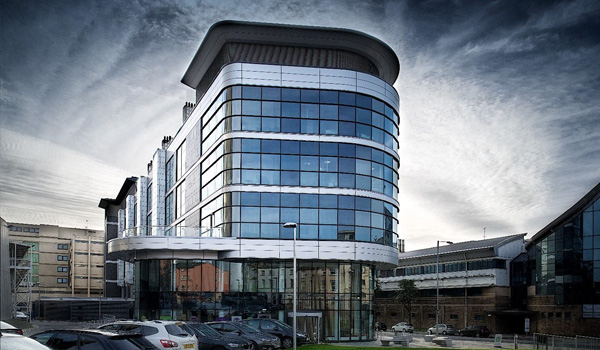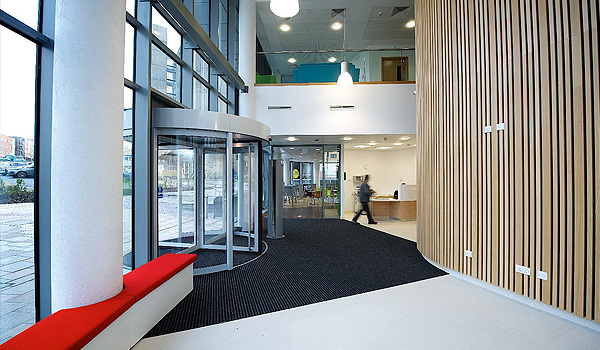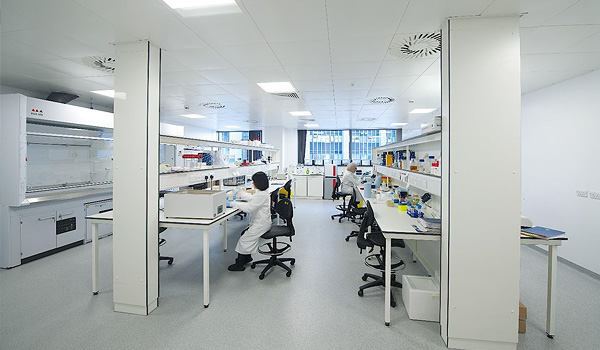Liverpool Life Sciences Accelerator
Facts and figures
- Client: Royal Liverpool & Broadgreen University Hospitals NHS Trust
- Design team: Nightingale Associates, Alan Johnston Partnership
- Type of facility: Centre for Life Science
- Contract Value: £24.23 million
- Building size: 6,500m²
- Construction: December 2015 - September 2017
Key features
- World class research facilities.
- Client satisfaction survey scores of 86.42%.
- Considerate Constructors Score of 44/50.
- Recognised in the CCS National Site Awards 2018.
- Exceeded social value target: 107% of apprentice target and 164% of employment activities target.
- 99.69% of waste diverted from landfill.
- Collaborative working with designers, suppliers and subcontractors.
- BREEAM Very Good Rating achieved.
- Just-in-time deliveries strategy and strong logistics plan.
- Fully booked Open Doors events.
- 9th project for Royal Liverpool & Broadgreen NHS Trust.
Project achievements
The Accelerator will allow us to further boost Liverpool’s reputation as a world-renowned centre of expertise. The collaboration with the Royal and SMEs will benefit global health by taking research and innovation from the lab to where it is needed most and will encourage further investment in Liverpool.Professor Janet Hemingway CBE,
Director: Liverpool School of Tropical Medicine
The Accelerator is a unique facility providing a centre for life science companies, the NHS and the Liverpool School of Tropical Medicine to work through collaboration, innovation and investment.
The 6,500m² facility is central to Liverpool’s vision to develop a city centre health campus. Providing approximately 2,750m² of lettable space, with state of the art laboratories including category 3 labs, insectaries, offices, collaboration zones, meeting rooms and cafeteria.
IHP secured the project through the Department of Health’s ProCure 21+ Framework (2-stage Design and Build).
Fundamental to the success of the project was the collaboration between the IHP team and joint clients; the Royal Liverpool and Broadgreen University Hospital Trust and Liverpool School of Tropical Medicine.
The facility will provide a hub for life sciences, enabling closer public and private sector collaboration between academia and industry in research and innovation, and support the commercialisation of health and life science research, whilst allowing knowledge transfer between business leaders, clinical colleagues, key opinion leaders and academics.
Innovation and best practice
IHP brought in specialist subcontractor input early in the design process to ensure safe working methods for erecting steelwork in constrained site conditions, including prefabricated elements to reduce risk.
Full use of BIM and 3D visualisations enabled the client to virtually explore the design, the design team to develop robust details taking into account all structure and services, and the construction team to manage the works on site without clashes.
The project scored 44/50 through the Considerate Constructors Scheme (CCS) at audits and was acknowledged by the CCS Best Practice Hub as an exemplar project in demonstrating improved performance and outcomes.
Environmental awareness/management e-learning modules were made available to subcontractors via IHP’s Intranet, with emphasis on prefabrication of specific elements and off-site cutting of materials to reduce material wastage and overcome logistical issues on site.
Early involvement and input from IHP’s BREEAM Assessor helped maximise credits to achieve a Very Good Rating.
Commitment to local labour
A key commitment was to maximise local labour opportunities on the project. During the peak period of the construction phase 50% of the site workforce came from within 15 miles of the site and a further 9% from the 15-25 mile range.
Case studies
ProCure21/21+/22 Projects
- Liverpool Life Sciences Accelerator
- Chase Farm Hospital
- South Lakes Birth Centre
- St Catherine’s Community Hospital
- Bridgwater Community Hospital
- Broadgreen Hospital
- Broadgreen Hospital Barn Theatre
- ELPDU, Hackney
- Treatment Centre, Milton Keynes
- Walk In Centre, Milton Keynes
- Pathology Central Facility, Royal Oldham
- Phoenix Unit, Tooting
- WAU, Tooting
- Women and Children’s Unit, Manchester
- Ambulatory Radiotherapy Centre, Oldham









